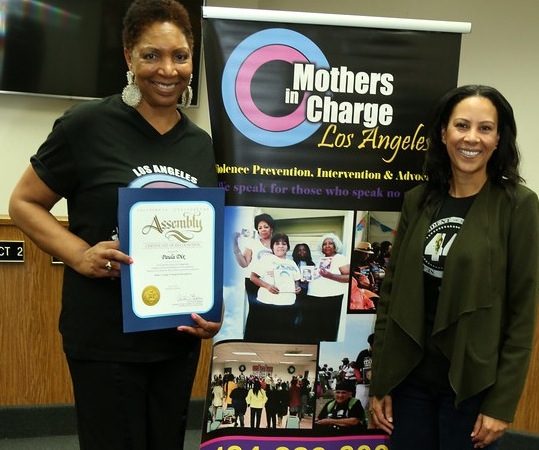By Shirley Hawkins, Contributing Writer
INGLEWOOD — Young people who have lost loved ones due to gun violence were in the spotlight July 25 when Mothers in Charge, an organization composed of mothers and grandmothers who have lost family members to gun violence, hosted its first virtual Zoom seminar.
Young people from throughout the country joined the Youth Survivors Speak Out seminar, telling their stories and offering solutions.
Among the young people speaking at the seminar were Jaylen and Jeniah Thompson, who have had two uncles die by gun violence.
Jaylen, 14, attends Sequoia High School in Redwood City, and Jeniah, 15, attends Castilleja School in Palo Alto. They said they still mourn their two uncles.
“One of my uncles died in 2012,” Jaylah said. “He was shot because he was going to the store and he was caught walking in someone else’s turf.”
Jeniah recalled her uncle Mark Brown, who was gunned down in April.
“Our other uncle, Mark Brown, died at the hands of police. He used to take us out for ice cream if we got good grades on our report cards,” she said.
Jeniah summed up the issue as well as anyone.
“The reason why gun violence is such a huge issue is because we don’t have a policy against obtaining guns,” she said. “If I could, I would enforce an official policy.”
Jaylen favored background checks on gun buyers.
“I think people need to go through a background check,” he said. “The country should only provide guns to those who need it for protection because some people buy guns for the wrong reasons.”
The seminar featured two break-out sessions that included adults as well as youth.
Moderated by Executive Director of Mothers in Charge Los Angeles Paula Henderson-Dix, speakers included Assemblywoman Autumn Burke, educators Bettye Wilson and Gina Henry, local activist Michael McCarty and Rev. Robert Campbell.
Henderson-Dix also included a slide show that detailed the history of systemic racism.
“I wanted the youth to know about the country’s biased legacy,” she said.
Burke announced that she will be introducing a bill in the state Legislature to ensure the safety of Black and brown children.
“As a black mother and legislator, I am committed to making sure that our Black youth are treated with dignity and respect and that they can walk to the store and come back home unharmed,” she said. “I want Black and brown children to be able to walk without fear and move beyond surviving to actually flourishing.”
Henderson-Dix, who lost her 20-year-old son, Leeban Adan, to gun violence in 2010, said, “African-Americans are only 6% of the population, but 40% of homicides of black men remain unsolved.
The justice system is not putting enough emphasis on solving these homicides. I thought that I was the only one who was hurting. The hurt never goes away.”
Henderson-Dix said she realized the effect that gun violence has on the lives of loved ones that are left to mourn.
”I became concerned when my granddaughter, Leah, began asking questions about her father, my son, who died before she was born. She would ask, ‘What type of food did he eat?’ and ‘What was his favorite color?’ I wanted her to become empowered to speak out against violence and to know that she is not alone.”
With the death of George Floyd and protests against police violence sweeping the country, Henderson-Dix felt that it was imperative for youth to understand the importance of their voice.
“I want the youth to speak out on issues that impact them so that they don’t feel so vulnerable and helpless,” she said. “A lot of protest movements have been led by young people.”
Greg Peltz, 19, lost his uncle, Lonnie Brown, and his friend, Muhammad.
“I realized that violence is not the answer and that people need to talk things out,” he said. “It’s easy for someone to get access to a gun. It’s kind of crazy.
“They need to do more background checks,” he added.
Two activists talked about feeling empowered when they used their voices to speak out.
“I was 13 years old when I organized a March for our Lives march in Santa Monica in solidarity with the school shootings at Stoneman Douglas High School,“ said Antonella Borjas, who attends Santa Monica High School. “I felt it was my time to get involved and bring forth the conversation about gun control and reform.”
Michael McCarty said that his activism was sparked as a 17-year-old student when he attended high school in Chicago.
“We organized a walkout and delivered a list of demands to the school’s administration,” McCarty said. “We made a stand and really shook things up. There’s a power in standing up and speaking out. Even if it’s a small group, just standing up and speaking out gains the attention of the people.”
McCarty said his school withheld the high school diplomas of the protesters.
“But thirty-one years later, the school apologized to us and finally gave us our diplomas,” McCarty said.
“I learned that friends and families who experience the loss of loved ones are really affected,” said Phoenix Noble, who attends Olney Charter High School in Philadelphia and who lost her father before she was born. “We can’t do anything different if we continue to exist with closed mouths.”
Noble said that she plans to speak out against gun violence.
“I would speak from personal experience about how gun violence affects people, especially mothers,” she said. “We are given the option to speak up and make a change or be a bystander and complain about justice not being served.”
When it was over, Henderson-Dix was satisfied with the virtual seminar and what she heard from participants, especially the young speakers.
“When young people speak out, they can change their community,” she said.









